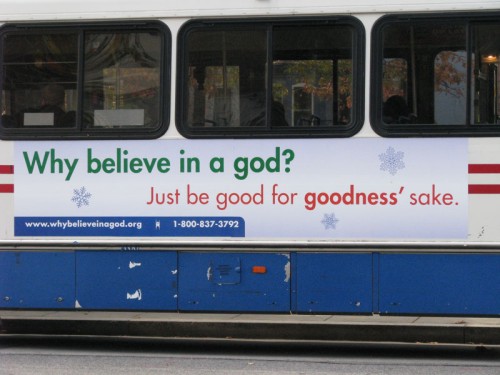Ad campaign by American Humanist Association
Sociologist Lori Fazzino was interviewed by Valerie Tarico for Alternet about her graduate work in sociology, exploring religion conversion and deconversion. Fazzino was inspired by the contradictions of “Sin City”, where 77% of the population identifies as religious, primarily Christian.
Fazzino asserts that morality and ethics are completely disconnected from any religion or religious thinking, but doesn’t provide the proof; her work seems more focused on politically-conservative Evangelical Christians, which she attributes to her own lived experience and personal history.
From the article:
I was raised Catholic and got saved at an Evangelical mega-church at age 16. But in 2007, I was excommunicated, well as much as you can get excommunicated from a Protestant church. I was living just south of Seattle, very involved in a church called Real Life. I also was in a very bad marriage with a man who lied to get me down the aisle. About a year in, I learned that we were deeply in debt to the point that we almost lost our house.
Well, I’m a survivor. I used to dance at a club when I was 18, and so I decided to go to Alaska and dance. On the way, I got in a very bad car accident; I was hanging upside down in my car. After they got me out, my husband called our pastor. When the pastor learned why I was on the road, he basically said, “Lori is nothing but a whore, and if she comes around here we will have her arrested.” He didn’t want me tainting the church teenagers.
Distressingly, Fazzino has faced discrimination both as a ‘sinful’ Christian and as an atheist, and recounts being passed over for job opportunities by discriminatory employers. Part of her critique of the idea that faith provides morality is directly drawn from these experiences. Fazzino documents and critiques the discrimination that many atheists, agnostics, and other secularists face.
Do you see any problems with Fazzino’s theories on ethics and morality? Do you think that any one has a convincing ethical system that doesn’t owe an intellectual debt to early religious moral codes? Are there any viable ethical or moral systems that pre-date organized religion and may have influenced early religious moral thinking?

